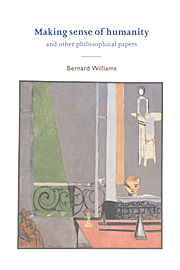Book contents
- Frontmatter
- Contents
- Preface
- I Action, freedom, responsibility
- II Philosophy, evolution, and the human sciences
- 7 Making sense of humanity
- 8 Evolutionary theory and epistemology
- 9 Evolution, ethics, and the representation problem
- 10 Formal structures and social reality
- 11 Formal and substantial individualism
- 12 Saint-Just's illusion
- III Ethics
- Index
8 - Evolutionary theory and epistemology
Published online by Cambridge University Press: 28 January 2010
- Frontmatter
- Contents
- Preface
- I Action, freedom, responsibility
- II Philosophy, evolution, and the human sciences
- 7 Making sense of humanity
- 8 Evolutionary theory and epistemology
- 9 Evolution, ethics, and the representation problem
- 10 Formal structures and social reality
- 11 Formal and substantial individualism
- 12 Saint-Just's illusion
- III Ethics
- Index
Summary
If you consider theories in general, you usually find that if they are capable of very powerful explanatory applications, it is quite hard to apply them vacuously; while if they are easy to apply vacuously, it is hard to make them yield powerful explanations elsewhere. The power to explain, and the possibility of vacuity, are usually related to each other inversely. Particle physics maximizes the first and minimizes the second, while with systems theory, for instance, it is the other way round.
The theory of evolution by natural selection is untypical in this respect. It can be applied in such a way as to yield extremely powerful explanations, but it is also very susceptible to vacuous applications, which explain nothing and barely provide an interesting description of the matters in question. The reason that both these things are possible lies in this, that the basic pattern of explanation that the theory uses is extremely simple and familiar, and it can be applied where it is not obvious – that is why it is powerful – but its strength is very sensitive to certain conditions on the structure of the situation, which control the application of the theory, and it may easily look as though those conditions are satisfied when they are not.
In these remarks I shall consider some applications of evolutionary ideas to the theory of knowledge. In this area, as in others that involve human culture, it is very important to distinguish two different questions. The distinction turns on the kinds of thing that are supposedly selected for by the evolutionary process introduced by the theory.
- Type
- Chapter
- Information
- Making Sense of HumanityAnd Other Philosophical Papers 1982–1993, pp. 90 - 99Publisher: Cambridge University PressPrint publication year: 1995



